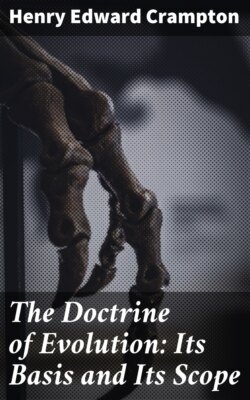Читать книгу The Doctrine of Evolution: Its Basis and Its Scope - Henry Edward Crampton - Страница 3
На сайте Литреса книга снята с продажи.
PREFACE
ОглавлениеTable of Contents
The present volume consists of a series of eight addresses delivered as the Hewitt Lectures of Columbia University at Cooper Union in New York City during the months of February and March, 1907. The purpose of these lectures was to describe in concise outline the Doctrine of Evolution, its basis in the facts of natural history, and its wide and universal scope. They fall naturally into two groups. Those of the first part deal with matters of definition, with the essential characteristics of living things, and, at greater length, with the evidences of organic evolution. The lectures of the second group take up the various aspects of human evolution as a special instance of the general organic process. In this latter part of the series, the subject of physical evolution is first considered, and this is followed by an analysis of human mental evolution; the chapter on social evolution extends the fundamental principles to a field which is not usually considered by biologists, and its purpose is to demonstrate the efficiency of the genetic method in this department as in all others; finally, the principles are extended to what is called "the higher human life," the realm, namely, of ethical, religious, and theological ideas and ideals.
Naturally, so broad a survey of knowledge could not include any extensive array of specific details in any one of its divisions; it was possible only to set forth some of the more striking and significant facts which would demonstrate the nature and meaning of that department from which they were selected. The illustrations were usually made concrete through the use of photographs, which must naturally be lacking in the present volume. In preparing the addresses for publication, the verbal form of each evening's discussion has been somewhat changed, but there has been no substantial alteration of the subjects actually discussed.
The choice of materials and the mode of their presentations were determined by the general purpose of the whole course. The audiences were made up almost exclusively of mature persons of cultivated minds, but who were on the whole quite unfamiliar with the technical facts of natural history. It was necessary to disregard most of the problematical elements of the doctrine so as to bring out only the basic and thoroughly substantiated principles of evolution. The course was, in a word, a simple message to the unscientific; and while it may seem at first that the discussions of the latter chapters lead to somewhat insecure positions, it should be remembered that their purpose was to bring forward the proof that even the so-called higher elements of human life are subject to classification and analysis, like the facts of the lower organic world.
It may seem that the biologist is straying beyond his subject when he undertakes to extend the principles of organic evolution to those possessions of mankind that seem to be unique. The task was undertaken in the Hewitt Lectures because the writer holds the deeply grounded conviction that evolution has been continuous throughout, and that the study of lower organic forms where laws reveal themselves in more fundamental simplicity must lead the investigator to employ and apply those laws in the study of the highest natural phenomena that can be found. Another motive was equally strong. Too frequently men of science are accused of restricting the application of their results to their own particular fields of inquiry. As individuals they use their knowledge for the development of world conceptions, which they are usually reluctant to display before the world. It is because I believe that the accusation is often only too well merited that I have endeavored to show as well as circumstances permit how universal is the scope of the doctrine based upon the facts of biology, and how supreme are its practical and dynamic values.
It remains only to state that the present volume contains nothing new, either in fact or in principle; the particular form and mode of presenting the evolutionary history of nature may be considered as the author's personal contribution to the subject. Nothing has been stated that has not the sanction of high authority as well as of the writer's own conviction; but it will be clear that the believers in the truth of the analysis as made in the later chapters may become progressively fewer, as the various aspects of human life and of human nature are severally treated. Nevertheless, I believe that this volume presents a consistent reasonable view that will not be essentially different from the conceptions of all men of science who believe in evolution.
